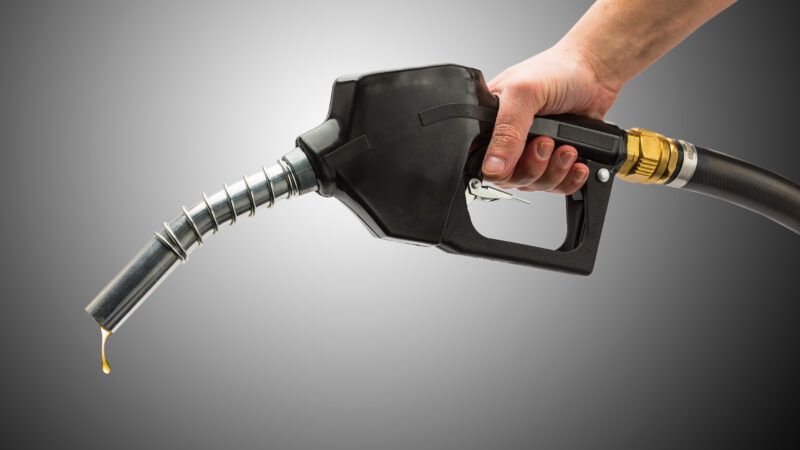Biden's Gas Tax Holiday Plan Already Running on Empty
Prominent Democrats including Joe Manchin oppose a bad idea whose time has seemingly not yet come.

In the hours before President Joe Biden held a press conference to officially call on Congress to approve a 90-day federal gas tax holiday, several prominent members of the president's own party effectively killed the idea.
Rep. Peter DeFazio (D–Ore.), chairman of the House Transportation Committee, released a statement Wednesday morning calling the idea "well-intentioned" but full of problems. Chief among them is the fact that suspending the gas tax for 90 days would blow a $10 billion hole in the federal Highway Trust Fund, for which the gas tax acts as a user fee.
Over in the Senate, the crucial swing vote of Sen. Joe Manchin (D–W.Va.) once again swung against Biden. "To do that and put another hole in the budget is something that is very concerning to me," Manchin told ABC News just before Biden's speech. "I'm not a yes right now, that's for sure."
Nevertheless, Biden insisted on asking Congress for a three-month suspension of the gas tax, which is applied at a rate of 18 cents per gallon for unleaded gasoline and 24 cents per gallon for diesel. "By suspending the 18-cent gas tax—federal gas tax for the next 90 days, we can bring down the price of gas and give families just a little bit of relief," Biden said. If states also suspended their gas taxes, oil companies hiked refinery capacity, and if all the benefits of those two changes accrued to consumers, gas prices could drop by as much as $1 at the pump, he said.
In what seemed like an attempt to respond to the budgetary concerns raised by DeFazio, Manchin, and other Democrats in Congress, Biden argued that the loss of Highway Trust Fund revenue could be offset with funds from elsewhere in the federal budget.
But the federal budget is on pace to run a $1 trillion deficit this year. So what Biden is really saying is that the federal government should borrow even more money to backfill the gap created by the proposed gas tax holiday. That's probably unlikely to address Manchin's well-documented worries about the state of the federal budget and the cost of borrowing.
Even if the math made sense, however, a 90-day suspension of the gas tax is a fundamentally bad idea for both fiscal and political reasons.
Reason's Christian Britschgi laid out the fiscal policy side of that debate yesterday. "People hate taxes and rightly so. But the federal gas tax is more appropriately thought of as a user fee that charges people for a service they consume," Britschgi wrote. "Fairness demands charging drivers for the roads. The only alternative would be to require nonmotorists to subsidize driving infrastructure for them."
Beyond that, the promised benefits of halting the gas tax are not a sure thing. The Atlantic's Derek Thompson pointed out that Biden's proposal would serve primarily to boost the profits of oil companies—the same companies that Biden often (wrongly) claims are responsible for stoking inflation by reaping record profits.
As for the political angle, Manchin touched on that during his remarks to ABC News on Wednesday.
"My other [objection] would be the political ramification," he said. "It goes off at the end of September. Which politician up here is going to be voting to put that 18-cent tax back on a month before the November election? So, we just dig the hole deeper and deeper and deeper."
Indeed, a 90-day suspension of the gas tax is probably not merely a 90-day suspension of the gas tax—for the same reasons that so many temporary government programs persist. Until the federal government finds an alternative way to pay for road and bridge projects, the gas tax user fee ought to remain in place.
Still, it's worth wondering what exactly Biden hoped to accomplish by rolling out this plan without having first done the hard work of shoring up support among his own party. If the Senate's swing vote and the chairman of the House Transportation Committee are against you on a matter of transportation policy, there's probably not much to be gained by standing at a podium and demanding its passage.
This is yet another instance of "do-something-ism" from a White House that still seems hopelessly lost on matters of economic policy. Biden keeps discarding practical steps to help fight inflation—like cutting tariffs, which could save Americans $800 this year—in favor of cockamamie schemes like trimming a few pennies from the gas tax or making it easier for drivers to purchase biofuels that most Americans don't have access to in the first place.
If Biden wants to look like he's doing something, next time he should try proposing something actually worth doing.


Show Comments (37)